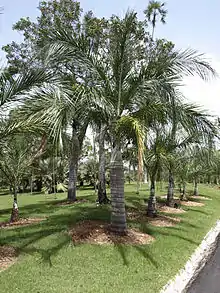| Pseudophoenix vinifera | |
|---|---|
 | |
| Scientific classification | |
| Kingdom: | Plantae |
| Clade: | Tracheophytes |
| Clade: | Angiosperms |
| Clade: | Monocots |
| Clade: | Commelinids |
| Order: | Arecales |
| Family: | Arecaceae |
| Genus: | Pseudophoenix |
| Species: | P. vinifera |
| Binomial name | |
| Pseudophoenix vinifera | |
| Synonyms | |
Pseudophoenix vinifera (Dominican Spanish: cacheo, Haitian Creole: katié)[1] is a palm species endemic to the Caribbean island of Hispaniola, in the Dominican Republic and Haiti.
Uses
Pseudophoenix vinifera was once used in palm wine production. Trees were cut down and the pith was extracted, especially from the swollen portion of the stem. Sap was then extracted and fermented.[1][2]
References
- 1 2 Henderson, Andrew; Gloria Galeano; Rodrigo Bernal (1995). Field Guide to the Palms of the Americas. Princeton, New Jersey: Princeton University Press. ISBN 978-0-691-08537-1.
- ↑ Haynes, Jody; John McLaughlin (November 2000). "Edible Palms and Their Uses" (PDF). Fact Sheet MDCE-00-50-1. University of Florida Institute of Food and Agricultural Sciences. Archived from the original (PDF) on December 10, 2006. Retrieved 2007-01-17.
This article is issued from Wikipedia. The text is licensed under Creative Commons - Attribution - Sharealike. Additional terms may apply for the media files.